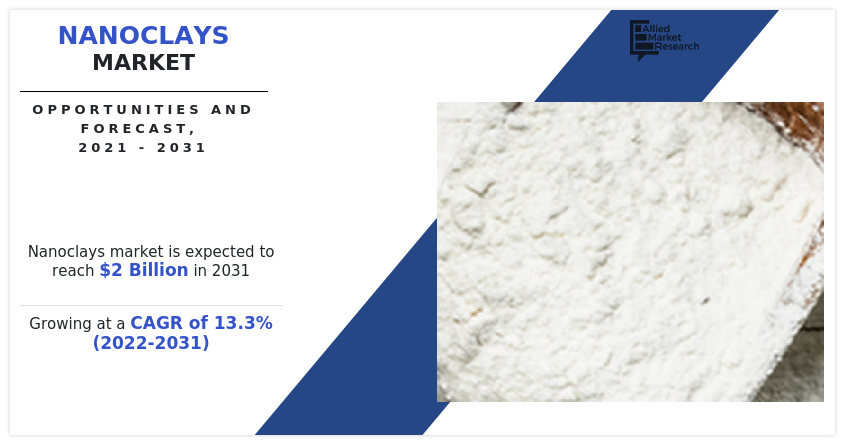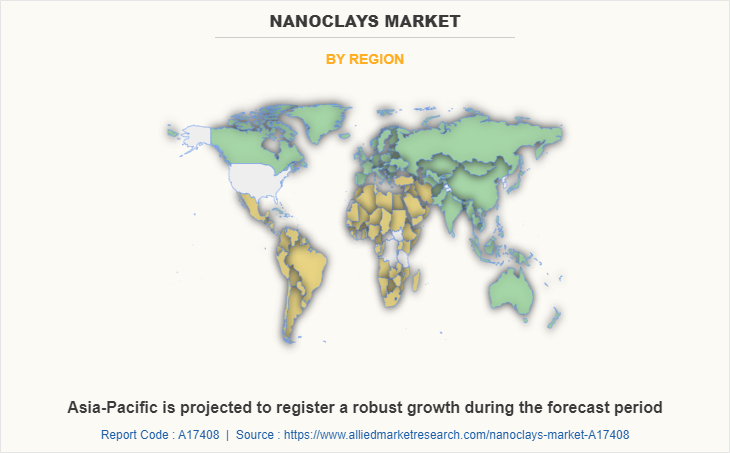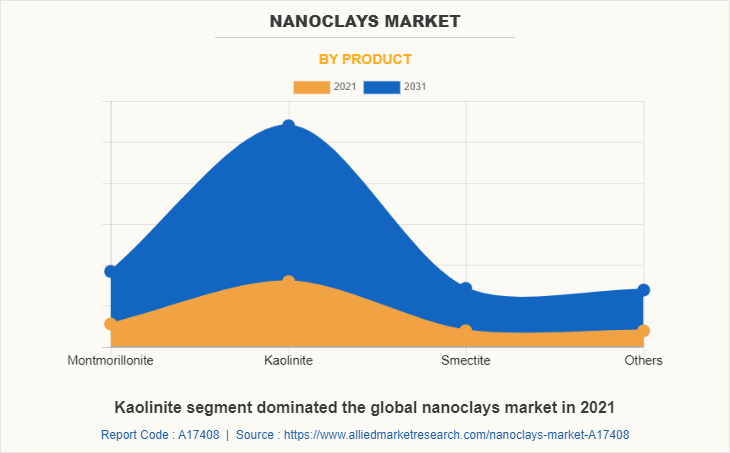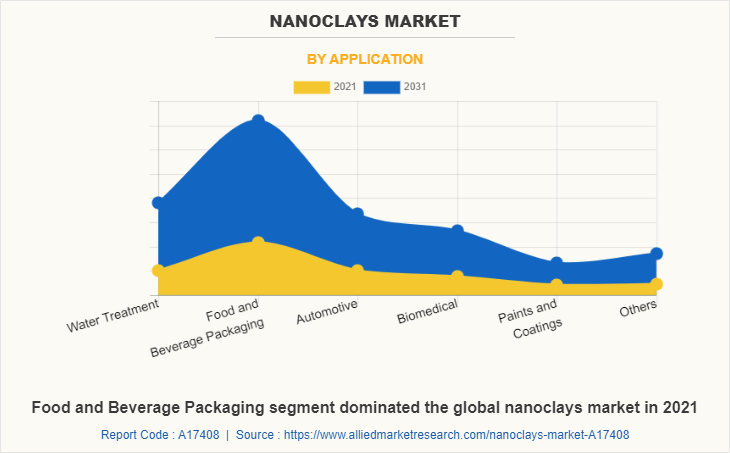Nanoclays Market Size & Insights:
The global nanoclays market size was valued at $0.6 billion in 2021, and is projected to reach $2.0 billion by 2031, growing at a CAGR of 13.3% from 2022 to 2031.
How to Describe Nanoclays
Nanoclays are nanoparticles of layered mineral silicates. Nanoclays are classified into various groups, including montmorillonite, bentonite, kaolinite, hectorite, and halloysite. Nanoclays are sprayed directly to dry sandy soil, where they penetrate deep into the soil and coats each sand particle. Nanoclays is used across many applications such as water treatment, food & beverage packaging, automotive, biomedical, paints & coatings, and others. It is used as reinforcing agents in food packaging films and coatings. Nanoclays are one of the most widely used and studied nanoagents that are utilized to prepare nanocomposites for food packaging.

The increasing use of nanoclays to enhance the mechanical properties of thermoplastics, allowing them to be used in engineering applications like vehicle bumpers and gears is driving the nanoclays market. Also, surge in use of nanoclays-based films in packaging sector for antimicrobial activity is further propelling the growth of the nanoclays industry. However, toxic nature of nanoclay is anticipated to hamper the nanoclays market growth. On the contrary, increased demand for nanoclays in the paints and coatings is expected to generate lucrative opportunities for the global nanoclays market.
Nanoclays Market Segment Review:
The nanoclays market is segmented into product, application, and region. On the basis of product, the market is categorized into montmorillonite, kaolinite, smectite and others. On the basis of application, the market is categorized into water treatment, food & beverage packaging, automotive, biomedical, paints and coatings, and others. Region-wise, the market is studied across North America, Europe, Asia-Pacific, and LAMEA.

Asia-Pacific is projected to register a robust growth during the forecast period. Nanoclays is widely used in Asia-Pacific to improve the mechanical qualities of thermoplastics, allowing them to be used in engineering applications such as car bumpers, gears, and so on. Nanoclays are rapidly being used in automobile components and packaging due to their reinforcing effects, low cost, commercial availability, high stability, and relative simplicity of processing in conjunction with the polymer matrix.

Kaolinite segment dominated the global nanoclays industry in terms of revenue, in 2021. Kaolinite nanoclays used to make paper, but it is employed in ceramics, light bulbs, paint, rubber, adhesives, smoking pipes, white wash in brickwork, absorbents, and soap. Kaolinite nanoclays is widely utilised in the ceramic sector, where its high fusion temperature and white burning properties make it ideal for the production of whiteware, porcelain, and refractories. These are also used in the production of ink. Kaolinite nanoclays aid in adjusting the consistency of printing inks to the correct value, preventing pigment sedimentation, giving proper color dispersion, and achieving the required film thickness.

Food and Beverage Packaging segment dominated the global nanoclays market in 2021. Nanoclays are used as reinforcing agents in food packaging sheets and coatings. In the food business, nanoclays may be used to detect pathogens in packaging, provide stronger tastes and color quality, and increase safety by strengthening barrier qualities. Nanoparticles are used in food packaging to improve mechanical and physical attributes such as durability, strength, flexibility, biodegradability, heat resistance, UV absorptivity, water vapour and oxygen impermeability.
Which are the Leading Companies in Nanoclays
The major players operating in the global nanoclays market include American Elements, Attogene Corporation, BASF SE, Dow Chemical Company, Elementis PLC, Evonik Degussa GmbH, Huntsman International LLC, Kowa Company Ltd, Laviosa Corporate, Mineral Technologies, Nanografi Nano Technology, Nanoshel LLC, SABIC, Southern Clay Products Inc, and Sun Chemicals.
What are the Key Benefits For Stakeholders
- This report provides a quantitative analysis of the market segments, current trends, estimations, and dynamics of the nanoclays market analysis from 2021 to 2031 to identify the prevailing nanoclays market opportunities.
- The market research is offered along with information related to key drivers, restraints, and opportunities.
- Porter's five forces analysis highlights the potency of buyers and suppliers to enable stakeholders make profit-oriented business decisions and strengthen their supplier-buyer network.
- In-depth analysis of the nanoclays market segmentation assists to determine the prevailing market opportunities.
- Major countries in each region are mapped according to their revenue contribution to the global market.
- Market player positioning facilitates benchmarking and provides a clear understanding of the present position of the market players.
- The report includes the analysis of the regional as well as global nanoclays market trends, key players, market segments, application areas, and market growth strategies.
Nanoclays Market Report Highlights
| Aspects | Details |
| By Product |
|
| By Application |
|
| By Region |
|
| Key Market Players | ELEMENTIS PLC, SOUTHERN CLAY PRODUCTS INC, NANOSHEL LLC, HUNTSMAN INTERNATIONAL LLC, AMERICAN ELEMENTS, SABIC, ATTOGENE CORPORATION, LAVIOSA CORPORATE, EVONIK DEGUSSA GMBH, NANOGRAFI NANO TECHNOLOGY, BASF SE, Mineral Technologies, The Dow Chemical Company, KOWA COMPANY LTD, SUN CHEMICALS |
Analyst Review
According to the perspective of the CXOs of leading companies, the nanoclays market is anticipated to grow in near future due to its extensive use in applications such as water treatment, food & beverage packaging, automotive, biomedical, paints & coatings, and others end-use industries.
Moreover, surge in use of nanoclays in packaging sector is expected to drive the market growth during the forecast period. Nanoclays-based films containing essential oils improve the barrier characteristics of nanocomposites synergistically, extending the shelf life of packaged food goods. These exhibit increased antimicrobial effectiveness against foodborne pathogens and prevent lipid oxidation.
However, toxic nature of nanoclay is projected to hinder the market growth. The Asia-Pacific region is projected to register a robust growth during the forecast period.
The global nanoclays market was valued at $0.6 billion in 2021, and is projected to reach $2.0 billion by 2031, registering a CAGR of 13.3% from 2022 to 2031.
Asia-Pacific is the largest regional market for Nanoclays.
Food and beverage packaging is the leading application of nanoclays Market.
The increasing use of nanoclays to enhance the mechanical properties of thermoplastics, allowing them to be used in engineering applications like vehicle bumpers and gears is driving the nanoclays market. Also, surge in use of nanoclays-based films in packaging sector for antimicrobial activity is further propelling the growth of the nanoclays market.
The major players operating in the global nanoclays market include American Elements, Attogene Corporation, BASF SE, Dow Chemical Company, Elementis PLC, Evonik Degussa GmbH, Huntsman International LLC, Kowa Company Ltd, Laviosa Corporate, Mineral Technologies, Nanografi Nano Technology, Nanoshel LLC, SABIC, Southern Clay Products Inc, and Sun Chemicals.
Loading Table Of Content...



